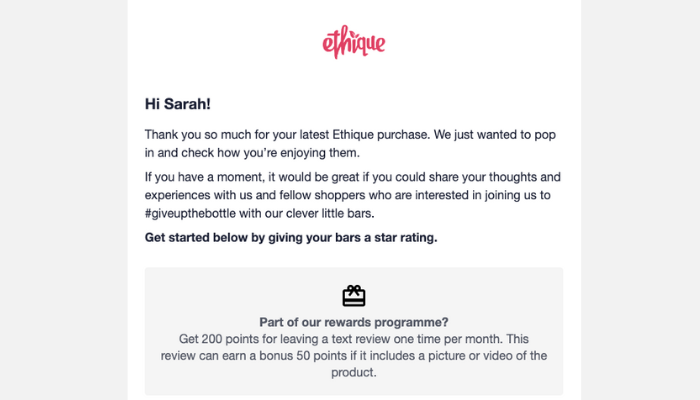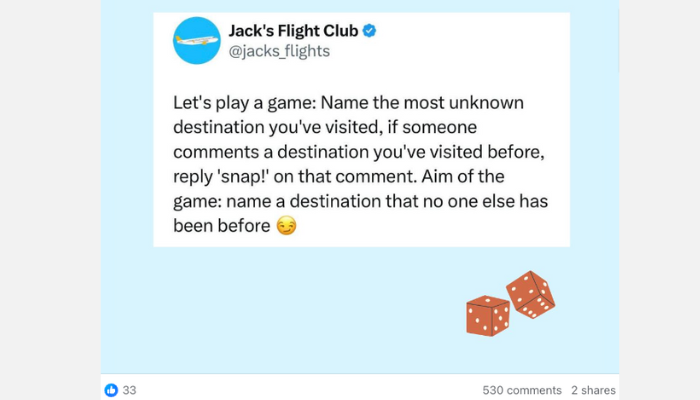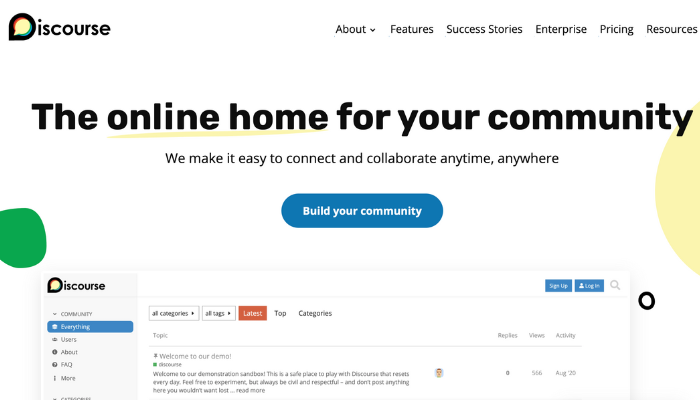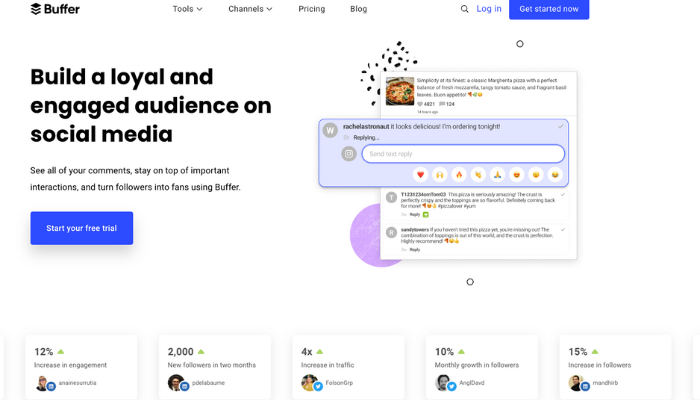Why Online Community Management Matters & Top Tips to Do it Effectively
Sarah Wisbey
Content Contributor, HeySummit
The majority of people (77%) report that the most important group they belong to is online.
Creating and maintaining an online community has never been more critical. It isn’t only about supporting the existing needs of your customers but also understanding how to support them better in the future. To meet your growth objectives, you need a community of loyal fans.
Keep reading to understand why community management is the backbone of your marketing strategy and for inspiration on what a well-managed community looks like.
What is Online Community Management?
Online community management is the practice of building and sustaining relationships within virtual communities. It involves facilitating interactions among community members, fostering engagement, and solving any disputes within the community.
While businesses across industries use the term, the definition is subjective. Some define community management as customer support; others will tell you it’s all about brand awareness and customer engagement.
The Importance of Effective Community Management
Community management helps to humanise your brand and keep people engaged with your mission.
Operating in the digital realm without community management is like starting a sports team without a coach. You need someone to lead initiatives and keep community members active and engaged with your brand.
If you’re wondering about the benefits of online community management, think about the last time you had a memorable interaction with a brand online. Did it make you feel like a valued customer, or did it make you feel like you were just another number on a big business's bottom line?
Chances are, the interaction you remember is the one that made you feel special and part of something bigger.
Effective community management allows you to stick in the minds of your customers and maintain customer loyalty.
Here are four key reasons online community management is essential for your business:
1. You Gain Insightful Feedback
Regular interactions with your customers make it much easier to understand what makes them tick, which can support many functions in your business. From new product development to understanding the customer decision-making process, regular interactions that help you know your customers’ motivations can assist you in making growth-driven decisions.
It doesn’t need to be complicated; here’s an example of a brand asking for post-purchase feedback. They also ask for a review to help them build brand authority and social proof for future customers.

If just 50% of customers who purchased a product respond to this follow-up email, the brand will have a ton of data to help them make decisions for improvement and future product development.
2. Improves Customer Life Time Value (LTV)
Building a solid online community around your brand encourages customer loyalty and repeat business. You can’t ignore loyal customers; a Harvard Business School study shows that increasing customer retention rates by as little as 5% can increase profits by 25% to 95%.
When you don’t depend on acquiring new customers for business, you can reduce your acquisition costs and focus on existing customers.
3. Increases Your Referrals
When you successfully manage an online community, you can help your customers build relationships with one another. Encouraging peer-to-peer interactions can be a considerable advantage, as managing support requests or client queries requires less time.
People love to share their knowledge and experiences. Take online communities such as Reddit and Quora, where users go to ask others for advice and tips on a vast range of topics.
Creating a community of true fans means you have a loyal following of brand advocates who share their experiences with potential customers, which can increase brand awareness and improve your referral rates.
4. You Can Educate Your Audience
What if you sell a product or service that falls into the “problem-aware, solution-unaware” category of awareness? You will need to educate your potential customers about your solution.
By providing value through a thriving online community, you can position your brand as an authority in your niche and build trust with prospective future customers. It’s your chance to showcase how your brand solves their problem.
Different Types of Online Community Management
When you think of online community management, social media platforms or Facebook groups may be the first thing that spring to mind. They are, after all, popular ways for brands to maintain relationships and create a sense of community.
But there’s so much more to building an online community management strategy than staying active across social media platforms. Take a look at popular online community management courses, and they will show you there are dozens of different community management types. Let’s take a look at the most popular:
1. Content Management
This involves creating and managing your brand’s content within your chosen platform/s. It can include planning content calendars and publishing articles, posts, and videos relevant to your community’s interests and goals.
While social media may dominate the content bucket, it refers to all your customer interactions, from newsletters, blog posts, interactive webinars, and podcasts.
Learn more: In this post, find out how Juliana used sold-out webinars to grow her community.
2. Moderation Management
When you build a large online community, you want to ensure that people follow your community guidelines and respect one another.
We’ve all seen how messy things can get in Facebook post comments; without a moderator, people can get carried away expressing their opinions. A community manager plays a vital role in the moderation aspect of community maintenance.
3. Engagement Management
For a thriving community, you will encourage members to interact and engage. This involves initiating discussions, responding to comments and messages, encouraging collaboration between members, and organising online events for members.
Here’s an example of encouraging engagement between community members from the flight-finding website Jack’s Flight Club:

As you can see, encouraging community members to play a game was a successful way to get them interacting — the post racked up 530 comments!
4. Technical Management
Helping community members with technical aspects of using their accounts within your online community management system is critical to keeping members happy.
If you have updates or new features launching, you want to ensure your community members can use it smoothly.
5. Reporting Management
If you want to keep growing your online community and get the most from it, analysing the data about people’s interactions with it is a great way to understand areas for improvement.
When you grasp the data, you can make data-backed decisions about how to improve and grow.
The Role of an Online Community Manager
Now that you know the different types of online community management, let’s look at a community manager’s role in building and maintaining an active online community.
While online community manager jobs can vary hugely between industries, there are some standard features of the community manager’s role within an online community. These include:
Facilitating discussions
Moderating content
Maintaining an inclusive and positive atmosphere
Solving problems for community members
Resolving conflicts
An effective community manager needs, at a minimum
Empathy
Exceptional communication skills
An ability to think strategically
A deep understanding of your brand’s voice and broader marketing goals
While solely using a software platform for managing your community is tempting, hiring a real person for community building brings a human element to your brand.
AI is excellent for automating many tasks related to community management, but only a real person can understand the struggles your community is facing and provide empathetic responses.
A human community manager can quickly take control of a situation if it’s getting out of hand, for example, a dispute between community members. They can also add an element of authenticity and humour and help create trust in your community.
Why You Need an Online Community Management System
If you’re using multiple channels to communicate with your customers and foster engagement, you’ll want a central place to keep track of interactions, insights, and analytics.
An online community management system is software that can efficiently collate all peer-to-peer interactions, customer feedback, and interactions between team members and document customer support details.
When you use a centralised system to manage your community, you can:
Facilitate Efficient Communication
A central community management system enables communication to become streamlined and efficient; you can keep announcements and updates in one place, share resources, and allow community members to interact.
With smart software that integrates with your email management system, you can track which customers receive your news and updates.
Easy moderation
Using one platform to moderate all your community activity makes it simpler to consistently engage with your audience, monitor conversations, interact with community members, and manage spam.
With centralised moderation, it’s far easier to maintain a positive and respectful environment.
Monitor Community Growth and Retention
If your community is spread across multiple platforms, keeping track of growth and engagement and making strategic decisions about next steps can take time and effort.
When everything is in one place, you can gain a better overview of the fluctuations in members and what you can do to influence them positively.
Detailed Insights and Analytics
A management system allows you to gain valuable data and insights about your community, such as engagement levels, interests, trending topics, and preferences.
This information lets you make informed, data-backed decisions to improve and optimise your community. For example, understanding how and why people interact with your community can allow you to allocate your marketing budgets more efficiently.

When you engage your community using an online event platform like HeySummit to run online events and webinars, advanced analytic features allow you to segment your audience and track engagement and live attendance. With this data, you can ensure future communications are more personalised, speak directly to your customers’ needs, and thus, boost conversions.
Online Community Management Tools
Looking for the best online community tool for your business? Here are some of the options:
1. Community Forums
Tools designed specifically for managing your online community, such as Discourse or Vanilla Forums, are a great option if you want to host a discussion-based community. These tools enable you to integrate seamlessly with other platforms and have powerful moderation tools.

Discourse hosts over 20,000 online communities, showing it is a popular choice for many online communities.
While these platforms are open-source and highly customizable, they need some technical knowledge to set up. If you choose to host your community on a forum, you’ll need to remember that you rely on them for troubleshooting.
2. Your Existing Website or Newsletter
For full ownership of your online community, you can host it directly on your website or app. You could create an integrated forum into your existing domain to boost interaction amongst your community members.
While hosting your community via your website may seem easy, you’ll need advanced coding skills to build it from scratch. Without specific moderation tools, it may become exhausting for your community manager to keep on top of driving engagement and monitoring interactions.
You can also use your newsletter as a simple tool to drive community engagement. For example, ask readers to tell you their thoughts on a topic and then share the findings in the next edition of your newsletter. This strategy is a great way to give you ideas about the content that resonates most with your readers and helps your community feel connected to other members.

Mark Manson does a great job of this in his newsletter, where he asks email subscribers to share breakthroughs they had as a result of his content.
3. Social Media Management Tools
Suppose you go down the route of managing your online community via your social media accounts. In that case, you can create private groups on platforms such as LinkedIn and Facebook or a broadcast channel on Instagram.
Use a scheduling tool such as Hootsuite or Buffer to keep track of all your social channels in one place. These tools allow you to moderate and monitor conversations across channels from one dashboard.

They also offer advanced analytic tools for you to keep track of community growth. The downside of these tools is that they’re expensive and don’t offer integrations to platforms outside social media.
4. Messaging Apps
Many community managers have had a lot of success using messaging apps such as Slack or Discord to manage their community. These tools work best for B2C or peer-to-peer communities that like to facilitate regular discussion.
These messaging apps are great for creating invite-only requests, with easy-to-use control settings to manage permissions and interactions.
Pricing may be a barrier to entry for businesses with low budgets for community management, and integrations with other platforms are limited.
5. CRM Systems
Using a customer relationship management platform can effectively manage interactions between community members, enhance member engagement thanks to segmentation options, and offer personalised experiences.
Tools like Hubspot and Salesforce are good options for integrating customer service and community management into one.
However, these platforms have more of a focus on sales and marketing than community management, which may mean they lack the core functions you need, such as announcement features or moderation tools.
Developing your online community management strategy
You’ll set yourself up for success with a clear community management strategy. Random strategies won’t cut it if you want to build a thriving community that brings you all the benefits mentioned above.
Use these guidelines to build a community marketing strategy that stands out:
Define Clear Objectives
If you don’t know what you want to get from your community, how will you manage it effectively?
You could start by defining one or two objectives based on your current metrics.
For example, say your goal is to get feedback from 40 customers in the next three months; think about:
Whether or not this goal is realistic
How will you achieve the goal
What channel will be most appropriate
Why would the customers give you feedback? Is there an incentive for them?
What Metrics Will You Use to Measure Success?
Once your goals are clear, you’ll want to decide how you define a thriving community and how you will measure success. Examples of metrics to track:
Number of subscribers or followers
Amount of positive feedback or reviews from customers
Engagement from the community (shares, clicks, likes)
Increase in brand awareness
Boost in website traffic
Increase in conversions
Clearly defining what success will look like for your business will help you double down on the efforts that positively impact that goal.
How Will You Onboard New Members?
This task goes hand in hand with deciding which platform is the best for you to use to manage your community.
What will be the protocol for welcoming new community members?
How can people join your community? What details do they need to share?
Will they receive a list of guidelines and expectations upon joining?
Providing a positive experience when new people become part of your community will help build trust and foster brand loyalty from the offset.
How Will You Create Engagement?
Think about the primary way you will spark conversations amongst your members. It could be:
Through live online events or webinars (using a platform like HeySummit)
Creating polls
Questionnaires such as “Ask me Anything” so you can answer frequently asked questions for your audience
Asking the community about the type of content they would like to see from you
Asking them to share their thoughts and ideas on a topic
Consider your brand voice and how you interact with the people in your community; you want to speak to them in a way that makes them feel valued and that it’s worth their time to be part of the community.
Handling challenges
What will you do if things aren’t going right? You’ll need a strategy to handle community members making negative contributions or spamming the community.
Community management best practices
For successful online community management, follow some standard best practices.
Real-time Communication and Collaboration
Regular interaction is mandatory to build a thriving community. Posting content your audience wants to see, sharing thoughts and ideas, and interacting with their posts are essential for fostering engagement.
Community managers are usually responsible for posting announcements and up-to-date communications.
Establish Guidelines and Rules
For a community that contributes to your long-term goals, you’ll want members who contribute positively and constructively. If they are clear about the guidelines of being part of your community from the offset, you’ll reduce the number of spammers and time-wasters getting involved.
During online community management training, draft a guideline document with your community manager that covers everything from tone of voice to how to deal with bad behaviour. That way, everyone will be on the same page, and your brand will get the coverage and representation it deserves.
Be Authentic
One of the reasons people join online communities is to connect with like-minded individuals with the same interests and create meaningful connections. To host a thriving community, you must stay true to your brand. That means ensuring your brand voice shines through at all times, providing your members with the content they joined for, and listening to their feedback and opinions.
Giving members the space to share UGC (user-generated content) is also essential to your community remaining authentic. If it’s too one-sided, it will become another marketing channel that people will disengage with.
Build An Effective Online Community
When you establish clear goals from the offset, strategise how to achieve them, and choose the channel that best aligns with them, you’ll build a valuable community poised for long-term growth.
Following simple best practices and hiring community manager Experts will help you build a thriving community in no time.
Want to use live events and webinars to create real-time engagement and build your community ? Check out how HeySummit can make it simple for you.
Table of Contents
What is Online Community Management?The Importance of Effective Community Management Different Types of Online Community Management The Role of an Online Community ManagerWhy You Need an Online Community Management SystemOnline Community Management Tools Developing your online community management strategyCommunity management best practicesBuild An Effective Online Community Try HeySummit free
HeySummit is the easiest way for creators and educators to grow their audience, authority and revenue with professional online events created in minutes, not weeks.
Share this article on:
Recent Posts
Loading feed...